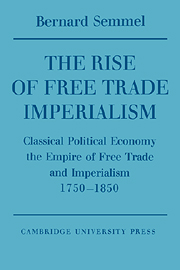 The Rise of Free Trade Imperialism
The Rise of Free Trade Imperialism Book contents
- Frontmatter
- Contents
- Preface
- 1 Introduction
- 2 Theory and politics of Free Trade Empire in the eighteenth century
- 3 The agrarian critique and the emergence of orthodoxy
- 4 The third school: Wakefield and the Radical economists
- 5 The Wakefield program for middle-class empire
- 6 Parliament, political economy, and the Workshop of the World
- 7 Cobdenism and the ‘dismal science’
- 8 Mercantilist revival
- 9 Classical political economy, the Empire of Free Trade, and imperialism
- Selected Bibliography
- Index
8 - Mercantilist revival
Published online by Cambridge University Press: 23 October 2009
- Frontmatter
- Contents
- Preface
- 1 Introduction
- 2 Theory and politics of Free Trade Empire in the eighteenth century
- 3 The agrarian critique and the emergence of orthodoxy
- 4 The third school: Wakefield and the Radical economists
- 5 The Wakefield program for middle-class empire
- 6 Parliament, political economy, and the Workshop of the World
- 7 Cobdenism and the ‘dismal science’
- 8 Mercantilist revival
- 9 Classical political economy, the Empire of Free Trade, and imperialism
- Selected Bibliography
- Index
Summary
Envy bars out truth; in recommending free trade England is suspected to have a sinister object in view … Were Englishmen hostile to the prosperity of the continent, as continental politicians frequently assert, instead of urging free trade on its acceptance, we should keep it carefully to ourselves. We should guard it as the secret of our future greatness. We should prevent our neighbours, if we could, from sharing its manifold advantages.
The Economist, 11 September 1847We shall urge finally, that the high place which England occupies, as the first among the commercial nations of the world, has been assigned to her in the order of providence, not by a fortuitous concurrence of events … but as the natural and proper consequence of her possessing in a superior degree, the elements of industrial greatness …
Foreign and Colonial Quarterly Review, I, No. 1, July 1843Though he could not believe with the author of an able pamphlet (Col. Torrens) that the sun of England was set, that the commerce of England would continue to decrease, that wages would continue to decline, that the operatives would have to learn to live on inferior food: though he would not bring himself to believe all this, yet he was compelled to admit that there was great room for anxiety.
Gaily Knight, House of Commons, 6 April 1843In the years since the corn laws of 1815 were first debated, many members of both Houses of Parliament, as we have observed, had proclaimed, as had Dean Tucker over half a century earlier, the advantages a manufacturing country enjoyed over an agricultural one, and had declared that free trade was the policy by which an advanced economy might preserve such advantages.
- Type
- Chapter
- Information
- The Rise of Free Trade ImperialismClassical Political Economy the Empire of Free Trade and Imperialism 1750–1850, pp. 176 - 202Publisher: Cambridge University PressPrint publication year: 1970


